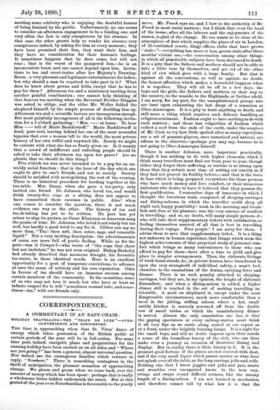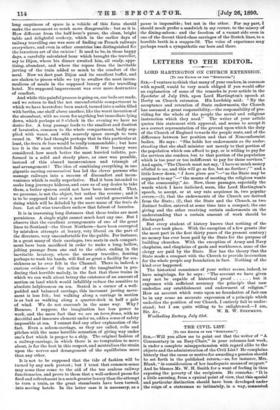CORRESPONDENCE.
A COMMENTARY IN AN EASY-CHAIR:
mOLIDAY TRAVELLING-THE "TRAIN DE LURE "-OVER- CONVENIENCE AND DISCOMFORT.
THE time is approaching when that St. Vitus' dance of energy whioh takes possession of the British public at -certain periods of the year will be in full action. For some time past, indeed, energetic plans and preparations for the -ensuing holiday have been carried on on all sides, and " Where are you going P" has been a general, almost universal question. Few indeed we the courageous families which venture to reply, " Nowhere." There is something contagious in the thrill of anticipation, the pleasant sensation of approaching change. We gloom and groan when we come back, over the amount of money which has been spent : perhaps that is really a wholesome bitter hidden underneath the sweet. But at this period of the year even Paterfamilias is favourable to the yearly move. Mr. Punch says no, and I bow to the authority of Mr Punch in most social matters ; but I think that even the head of the house, after all the labours and the enjoyments of the season, is glad of the change. He too wants to be clear of the atmosphere of dust which supplies the place of air in London, of ill-ventilated courts, dingy offices, clubs that have grown " stale ; "—everything has, more or less, grown stale after three months' violent use,—the conversation among other things. in which all practicable subjects have been discussed to death It is a pity that the fathers and mothers should not be able to take a little tour by themselves, and get rid of the other kind of riot which goes with a large family. But that is against all the conventions, as well as against, no doubt, the honest affection which makes a household happiest when it is together. They will all be off in a few days, the boys and the girls, the fathers and mothers, on their way to the country, to the seaside, to the Highlands, or further afield. I am sorry, for my part, for the unsophisticated groups who are bent upon exhausting the last dregs of a sensation at Ober-Ammergau. It is a pity to hunt anything to death, and still more a thing which requires such delicate handling as religious sentiment. Fashion ought to have nothing to do with such matters ; and those last vulgarities of fashion which collect a mob from the ends of the earth, under the auspices of Mr. Cook, to try how little spoiled after so many repetitions are a set of peasant-players, once unnoticed and natural, are odious to the observer,—perhaps you may say, because he is not going to Ober-Ammergau himself.
There is another delusion, more important practically, though it has nothing to do with higher elements, which I think many travellers must find out from year to year, though either they forget their suffering, or routine is so strong upon them that they submit next time of setting out exactly as if they had not proved its futility before,—and that is the train de fuze which is being prepared everywhere for those persons who have much money and love comfort, or their numerous imitators who desire to have it believed that they possess the first qualification. I remember days of innocence in which I thought the luxurious train, composed of sleeping-carriages and dining-saloons, in which the traveller could sleep all night and, happy possibility ! wash in the morning, and break- fast and dine at his pleasure, was the very essence of comfort in travelling ; and so, no doubt, will many simple persons dc, who will take their supplementary tickets with satisfaction, as feeling themselves assured of all that is best in travelling during their voyage. Poor people ! I am sorry for them. I advise them to save that supplementary ticket. It is a thing not unknown in human experience, that things which seem the highest achievements of that perpetual study of personal com- fort which brings so many conveniences to those who can afford to pay for them—have after a time to yield and give place to simpler arrangements. Thus, the elaborate fittings of wash-hand-stands, &c., in private houses, have been found to open the very stronghold of individual safety, a man's bed- chamber, to the emanations of the drains, carrying fever and disease. There is no such penalty attached to sleeping- carriages, but they are, in my opinion, the height of elaborate discomfort ; and when a dining-saloon is added, a higher climax still is reached in the art of making travelling in- tolerable. A meal on shipboard is, except under the most disagreeable circumstances, much more comfortable than a meal in the jolting, stifling saloon, where a hot, small untidy kitchen is scarcely screened off from the double row of small tables at which the unsatisfactory dinner is served. Almost the only consolation one has, is that the gaping spectators at every railway-station must think it all very fine as we rattle along seated at our repast as at a feast, under the brightly burning lamps. It is a sight for the small boys, and will no doubt impress upon their minds a sense of the boundless luxury of the rich, who can thus make even a journey an occasion of theatrical dining and display. But in reality there is little luxury in it. It is the greatest good fortune if the plates are not covered with dust, and if the very small liquor which passes muster as wine does not splash over all the table, as the long carriage jolts and rolls. Nothing else that I know joggles and jolts and jars, starts and stumbles over unexpected knots in the iron way, swings and sways round difficult corners, like the uneasy length of a dining-saloon. I am not learned in mechanics, and therefore cannot tell by what law it is that the
long emptiness of space in a vehicle of this form should make the movement so much more disagreeable : but so it is. How different from the half-hour's pause, the clean, bright table and delightful cookery, which in the earlier days of railway travelling one was sure of finding on French railways everywhere, and even in other countries less distinguished for the luxurious art of the cuisine ! It used to be, in those happy days, a carefully calculated hour which brought the traveller, say to Dijon, where his dinner awaited him, all ready, appe- tising, abundant, and where the repose from the inevitable jarring of the train added so much to the comfort of the meal. Now we dart past Dijon and its excellent buffet, and are shaken to pieces while we try to swallow the most incom- modious of meals in the supposed luxury of the travelling hotel. No supposed improvement was ever more destructive of comfort.
And while this painful process is going on, our beds are made, and we return to find the not uncomfortable compartment in which we have heretofore been seated, turned into a cabin filled with berths, one shelf above another, like the worst invention of the steamboat, with no room for anything but immediate lying down, which perhaps at 8 o'clock in the evening we have no desire for. A long passage leads to the smallest and dustiest of lavatories, common to the whole compartment, badly sup- plied with water, and with scarcely space enough to turn round in. We had thought perhaps that in this particular at least, the train de luxe would be really commendable ; but here too it is the most wretched failure. If true luxury were considered, how much better the most hurried toilette, per- formed in a solid and steady place, as once was possible, instead of this absurd inconvenience and triumph of mal-arrangement ! The idea of combining everything in one gigantic moving caravanserai has led the clever persons who manage railways into a success of discomfort and incon- venience which is really superlative. Had it been intended to make long journeys hideous, and cure us of any desire to take them, a better system could not have been invented. That, we presume, is not the object, but rather the reverse ; and it is to be supposed that ever a new and untried generation is rising which will be delnded by the mere name of the train de luxe. Let all wise travellers eschew that falsest of luxuries.
It is in traversing long distances that these trains are most
• pernicious. A single night cannot much hurt any one. But I observe that the excellent arrangements of one of the great lines to Scotland—the Great Northern—have been corrupted by mistaken attempts at luxury, very liberal on the part of the directors, very uncomfortable for the public. For instance, in a great many of their carriages, two seats in each compart- ment have been sacrificed in order to make a long, hollow, jolting passage from one end to the other, ending in the inevitable lavatory, where the unwary traveller, desiring perhaps to wash his hands, will find as great a facility for sea- sickness as he ever felt in the Channel. There is, indeed, a - curious evidence of the action of the imagination in pro- ducing that horrible malady, in the fact that those trains in which we can walk about betray the existence of an amount of motion on land which would infallibly reduce the sensitive to absolute helplessness on sea. Seated in a corner of a well- padded and balanced carriage, this incessant jarring move- ment is less felt; but walking along a carriage in motion is as bad as walking along a quarter-deck in half a gale of wind. We do not succumb in the same way. Why ? Because, I suppose, the imagination has less power to work, and the mere fact that we are on terra firma, with no deceitful and insecure element under us, adds a sense of safety impossible at sea. I cannot find any other explanation of the fact. Even a saloon-carriage, as they are called, rolls and pitches with the same horrible sensation of giving way under one's feet which is proper to a ship. The original fashion of a railway-carriage, in which there is no temptation to move about, is far the best in this respect, and neutralises the strain upon the nerves and derangement of the equilibrium more than any other.
It is not to be supposed that the tide of fashion will be turned by any such protest ; but I trust that common-sense may some time come to the aid of the too zealous railway functionaries, and prove to them that a well-ordered pause for food and refreshment is a much greater luxury than the attempt to turn a train, as the great steamboats have been turned, into moving hotels. In the latter case it is necessary, as a
pause is impossible ; but not in the other. For my part, I should much prefer a sandwich in my corner, to the misery of the dining-saloon : and the freedom of a vacant side even in one of the decent third-class carriages of the Scotch lines, to a horrible berth in a waggon-lit. The voice of experience may perhaps reach a sympathetic ear here and there.



































 Previous page
Previous page